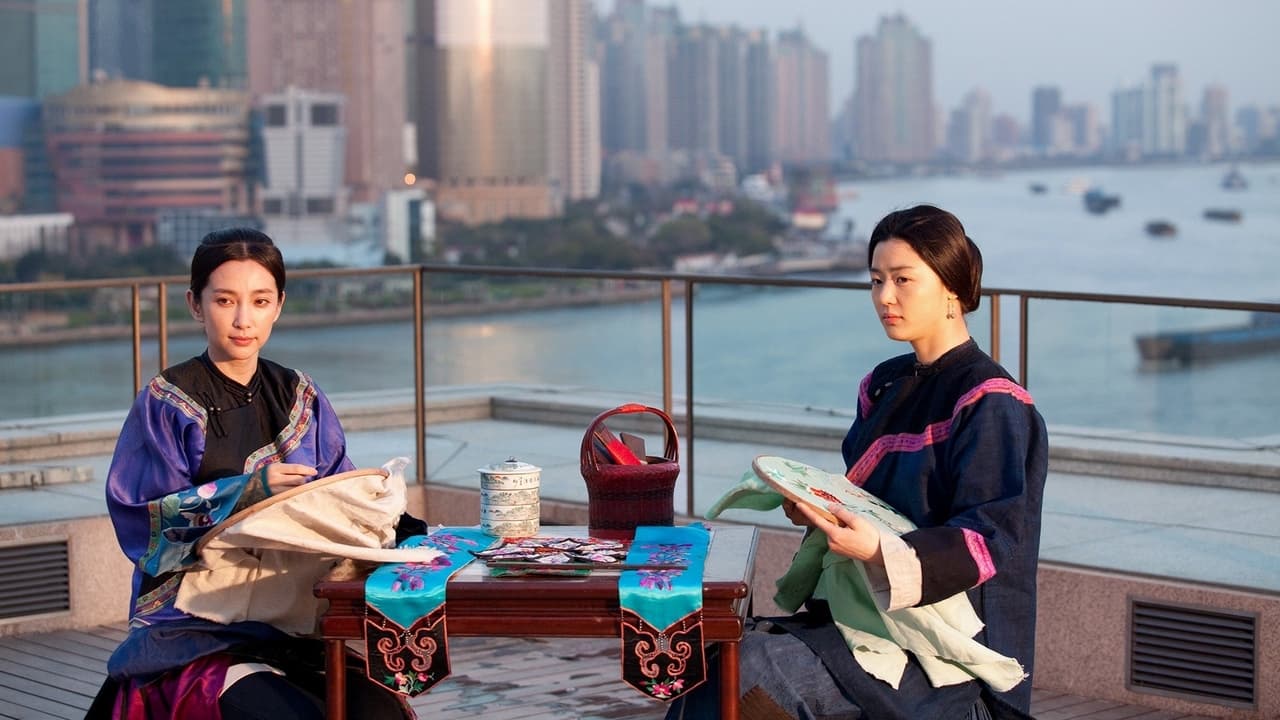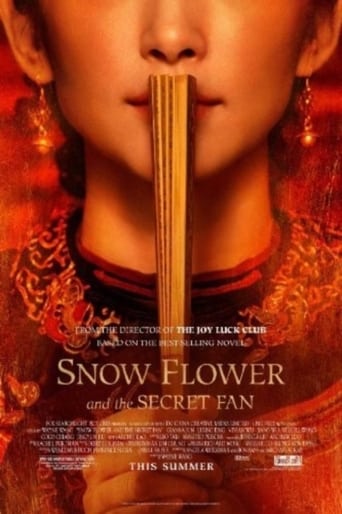

Adapted from the novel written by Lisa See, Snow flower and the Secret Fan, (screenplay written by Angela Workman, Ronald Bass, and Michael Ray and directed by Wayne Wang), is a cinematographically stunning and poignant illustration of cultural parallelism between two dramatically different eras of Chinese culture as it regards the conditions of life for women in these eras. Intertwining 19th century and modern day China, the story follows two pairs of laotong - literally meaning "old sames" (essentially soul sisters committed to one another for life) through the heartbreaking journey of their lives. The film focuses on women's status as second-class citizens and the intensely devoted relationships forged between them as the only source of genuine love and support for one another in the historical social climate that sought to isolate and devastate them paralleled with that of the contemporary era which offers promises through the glass ceiling of a misogynistic culture that appears beautiful from the outside. Snowflower and Lily, the laotong of 19th century China face the excruciatingly painful and crippling tradition of foot-binding, arranged marriages, and living as slaves with no rights and no love, save for the sisterly love they have forged for each other since they were first matched at the age of seven. Though circumstances of life separate them, their loyalty and sacrificial love stands in stark contrast to the cold, detached affect of their surrounding culture. I cannot overstate the absolute eloquence with which Wang visually captured and conveyed profound depth of emotion in such a way as to make the viewer feel intimately connected to the lives of these women. Furthermore, the brilliant score composed by British composer Rachel Portman beautifully complimented the stunning imagery, creating a powerful combination of artistry which further magnified my emotional connection and response to the events unfolding in the lives of Snow Flower and Lily. I must admit to spending a substantial portion of the film with my chest clenched, holding my breath in an attempt to maintain my composure, as I was so invested in the heartbreaking story unfolding on the screen. Nina and Sophia, inspired by their descendants Lily and Snow Flower, become laotong as well. Living in contemporary Shanghai, they are flawlessly portrayed by the same two women (Bingbing Li as Nina/Lily and Ji-hyun Jun as Sophia/Snow Flower), contributing a harmony to the complex structure of this intricate story. While the lives of Nina and Sophia appear to be rather synonymous in some broader ways to the contemporary life of other modern women, it becomes evident that their world is still very much entangled with the oppressive attitudes of its past. For all of their progress, women are still second-class citizens and the love these two women have for one another is the most precious and fragile gift either has. Though some of the hardships and tragedies they face seem less extreme than those of Snow Flower and Lily, the results of those events in their lives bear similarly devastating results. The most exquisite aspect of this film, however, is not the heartbreaking story of all that these women must endure, but of the extraordinary and immeasurable love they share and the extent to which they will sacrifice for one another. This film is profoundly heart-rending with a sublime ability to elicit such authentic emotion from the viewer that it almost carries a therapeutic effect. Without a trace of pretension, it gracefully and humbly shares a glimpse of a culture that is so richly saturated with anguish and offers us the opportunity to surrender wholly, if we will, to the most beautiful and sacred virtues of humanity - empathy and compassion - to a degree that we don't often allow ourselves to experience. Beyond a doubt, it was one of the best movies I have ever seen.
... View MoreSnow Flower and the Secret Fan is a "Chick Flick" and is best enjoyed by those 8 and older who know what it is to be a friend. This is a story of sisterhood which withstands the test of time itself. The musical score is quite nice and relaxing. It is a good movie to watch in the afternoon, alone or with your BFF. The movie is a bit too long, maybe 20 minutes could have been edited out. Switching back and forth through time is done okay. The movie requires a glass or two of wine and some pizza. Guys, don't bother with this film unless you want to impress your significant other. It is a slow pace film telling a love story between sisters of a sort. You won't easily forget this film overnight like many other films because it touches the heart.
... View MoreThe book explores the culture of 19th century China through a woman's eyes; in the book you see real relationships and heartbreak. The movie squanders all of that in favor of appearing "artistic" or "deep"; something it does not pull off at all.They unnecessarily add some modern characters to "parallel" the girls from the book. Said modern characters randomly switch between speaking Chinese and English, adding to the overall confusion and mess of the movie. The movie constantly switches back and forth from the modern to the actual book story line, making it extremely hard to follow, even for someone who has read the book. This also means that you make no real attachment to any of the characters. They change lines around and only include scenes of "significance" from the book- making it all completely insignificant. You get no sense of the deep-heart love they speak of. You barely see the characters at all.Overall, it is essentially two hours of thinking, "Is the movie going to start yet?"A real waste of an amazing book.
... View MoreThe current scandal surrounding Rupert Murdoch makes it all the more surprising that his wife produced Wayne Wang's "Snow Flower and the Secret Fan". But even so, it's still worth seeing. It tells the story of two friends in present-day Shanghai, and the connection that they have with two girls in 19th century China through a fan on which they wrote secret messages.Wang famously focused on Chinese-American families in "The Joy Luck Club", and took a bittersweet look at people's lives in "Smoke". This movie doesn't equal either of those, but I still recommend it. The development of Shanghai certainly reflects the changes in the lives of the girls (and the changes that China has undergone over the past 100 years). Not great, but worth seeing.
... View More